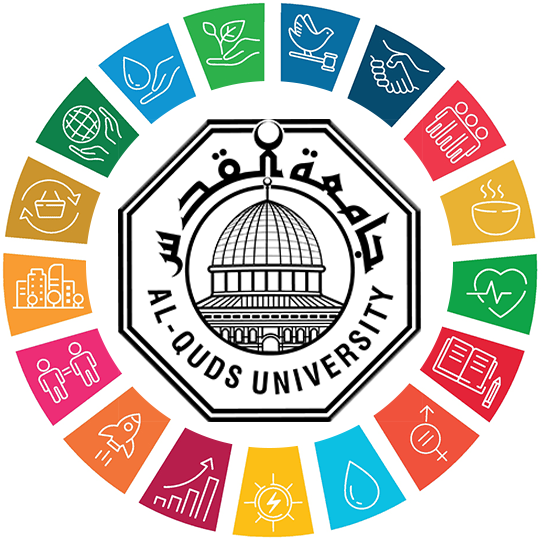Goal 6 aims to achieve universal and equitable access to safe and affordable drinking water for all, access to adequate and equitable sanitation and hygiene, and paying special attention to the needs of those in vulnerable situations, this will be done through improving water quality by reducing pollution, eliminating dumping and minimizing release of hazardous chemicals and materials, halving the proportion of untreated wastewater and substantially increasing recycling and safe reuse globally.
Al-Quds University recognizes the importance of clean water and sanitation in ensuring a sustainable and healthy future for all. The university contributes to SDG 6 through its academic programs, research initiatives, and community engagement efforts:
Water and Environmental Sciences Education: Al-Quds University offers degree programs in water and environmental sciences, engineering, and related fields, providing students with the knowledge and skills needed to address water resource management, sanitation, and pollution challenges. These programs focus on topics such as hydrology, water quality, wastewater treatment, and water resource planning and management.
Research on Water Resources and Sanitation: The university conducts cutting-edge research on various aspects of water resources and sanitation, including water quality monitoring, water treatment technologies, wastewater reuse, and sustainable water resource management. This research helps identify new technologies, practices, and policies that can improve water security, sanitation, and water resource management in the region and beyond.
Collaboration with Local and Regional Stakeholders: Al-Quds University works with local and regional stakeholders to address water and sanitation challenges. Through workshops, training sessions, and collaborative projects, the university provides technical assistance and support to help these stakeholders develop and implement sustainable water and sanitation solutions.
Community Outreach and Capacity Building: The university actively engages in community outreach programs that promote awareness about water conservation, sanitation, and hygiene. These initiatives involve providing education and training to local communities on sustainable water use, wastewater treatment, and sanitation best practices, empowering them to improve their water management and sanitation systems.
Water and Sanitation Innovation: Al-Quds University encourages innovation in water and sanitation technologies and practices, supporting research and development projects that aim to develop new solutions to water scarcity, pollution, and inadequate sanitation. By fostering a culture of innovation, the university contributes to the advancement of sustainable water and sanitation solutions that can have a lasting impact on communities and the environment.
Advocacy and Policy Development: Al-Quds University plays a key role in advocating for policies and strategies that address water and sanitation challenges. The university’s experts collaborate with organizations to develop and implement evidence-based policies that promote clean water and sanitation access for all.
In summary, Al-Quds University is dedicated to achieving SDG 6 through a comprehensive approach that includes education, research, collaboration with stakeholders, community outreach, innovation, and policy advocacy and supports the achievement of Goal 5 by:
- The university builds a lot of research and projects on the quality and desalination of water and the water footprint, as well as the management of water resources and wastewater, whether agricultural, health or industrial, and how to treat them.
- Holding training courses in the field of environmental protection and water treatment for all segments of the local community such as: farmers, women and teachers.
- Providing free drinking water.
- Water analysis and determination of its suitability for drinking through central laboratories in the university faculties
- Analyzing the wastewater and drains and knowing the extent of its suitability for irrigation and its use in agriculture in the university’s laboratories. It also provides consultations to citizens.
- Educating students, faculty and administrators about the importance and benefits of water conservation and rationalization
- Regular maintenance of taps, coolers and water tanks inside the university
- The use of high-quality water tanks, faucets and coolers inside the university to keep the water clean and safe.
SDG 6 (Clean Water and Sanitation) Progress:
Al-Quds University is actively contributing to SDG 6: Clean Water and Sanitation, through a series of educational, research, and practical initiatives.
The university’s academic programs in water and environmental sciences, engineering, and related fields provide students with essential knowledge and skills to address water resource management, sanitation, and pollution challenges. These programs, focusing on hydrology, water quality, wastewater treatment, and water resource planning and management, are crucial for developing expertise in water and sanitation issues.
In terms of research, Al-Quds University is engaged in cutting-edge studies on various aspects of water resources and sanitation, including water quality monitoring, water treatment technologies, wastewater reuse, and sustainable water resource management. This research contributes significantly to identifying new technologies, practices, and policies to improve water security and sanitation.
The university collaborates with local and regional stakeholders to address water and sanitation challenges. Through workshops, training sessions, and collaborative projects, it provides technical support to develop and implement sustainable water and sanitation solutions. Additionally, community outreach and capacity-building initiatives promote awareness about water conservation, sanitation, and hygiene, empowering local communities to improve their water management and sanitation systems.
Al-Quds University has also pioneered an innovative wastewater treatment system, led by Dr. Jawad Hasan Shoqeir, which aligns the institution with zero water consumption goals. This system, incorporating advanced wastewater purification techniques, allows for the reuse of treated water for various campus activities. The secondary treatment level of this process ensures that the maximum amount of treated wastewater can be repurposed, significantly minimizing pollutants and contributing to the university’s sustainability goals.
Furthermore, the university’s approach to water management involves diverse sources and meticulous measurement, reflecting its dedication to sustainability, efficiency, and environmental responsibility. The university utilizes the Main Artesian Well in Abu Dis, rainwater harvesting, and recycled water for various non-potable applications. Accurate measurement of water consumption from these sources ensures sustainable management, cost efficiency, environmental stewardship, and data-driven decision-making for water usage and conservation strategies.
